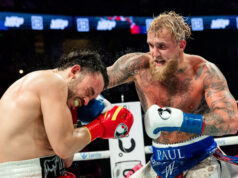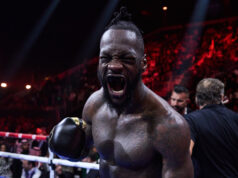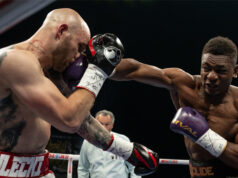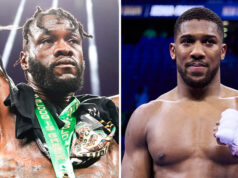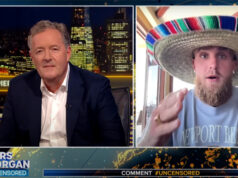Daniel Zaragoza
Why he’s in: For having a heart of gold and being a big factor at 118-122 for the better part of 15 years. Beat a bunch of good fighters, including some overlooked top Asian champions. Won 14 title fights, including two out of three in a blood-and-guts series with Paul Banke. Zaragoza’s late-career run was inspirational. In his late-thirties, he beat Hector Acero-Sanchez for the title and scored 4 defenses, including two wins over tough Japanese Joichiro Tatsuyoshi and becoming the first to beat undefeated Wayne McCullough. A heroic and inspirational fighter.
Why he shouldn’t be: In reality, he lost to most of the quality championship fighters he faced, including Miguel Lora, Jeff Fenech, and Tracy Harris Patterson. While it’s forgivable for even Hall of Fame fighters to lose a few times during such a long stay at the top, Zaragoza just never beat a truly elite fighter. A lot of good wins does count for a lot, as does his indomitable spirit. While very good, I just never thought I was necessarily witnessing greatness when I saw Zaragoza fight. Then again, maybe I’m still bitter because he beat up Frankie Duarte.
Ingemar Johansson
Why he’s in: Olympic silver medallist won the Heavyweight Championship of the World back when that really meant something. It’s important to remember that Patterson was rounding into a highly thought of champ by the time Johansson beat him. The seven-knockdown beating “Ingo” gave Patterson in the 3rd round of their 1959 bout was among the most brutal title-winning efforts of the time. Floyd Patterson was the only man to ever defeat the powerful Swede. Had a solid run to the title, beating some quality European heavyweights, including Henry Cooper. Also knocked undefeated Eddie Machen out in the 1st round.
Why he shouldn’t be: Looking back, Patterson was an excellent champion, though a flawed one—especially in the chin department. While other fighters are in the Hall of Fame based on one or two huge wins, Ingemar’s big moment doesn’t seem so special in retrospect, certainly not enough to warrant induction into the hallowed Hall. Getting smashed in two rematches doesn’t help, either. Made zero title defenses. If beating a few solid contenders and a Floyd Patterson-caliber champion were truly grounds for admission to the Hall, they’d have to open up a new wing.
Eight Boxers who should be in the Hall of Fame
Chris Eubank
Why he should be in: Rose to the top of a demanding middleweight scene in the U.K., going unbeaten in his first 43 fights. Came to prominence with a knockout over Nigel Benn in 1990. Twice beat excellent contender Michael Watson. During his reign, he beat championship-level fighters such as Thulani Malinga, Tony Thornton, Lindell Holmes, Ray Close, and Henry Wharton. Scored a big win in Graciano Rocchigiani’s hometown, decisioning the 35-0 longtime super middleweight standout. Performed heroically twice while losing in heartbreaking fashion to future David Haye-conqueror Carl Thompson after jumping to cruiser in his last two fights. Two-division champion made a combined 17 title defenses. Probably the best of a great group of super middleweight in the early and mid-nineties.
Why he probably won’t make it: Didn’t always fight like a great fighter is supposed to, barely exerting himself in some of his less demanding fights. Probably caught a few breaks from the judges along the way. While he beat a lot of good fighters, he never came through in a superfight-type situation. Unfortunate for his legacy that Michael Watson was almost fatally injured in their rematch, which prevented Watson from building up a resume that would bolster Eubank’s case. In addition, Rocchigiani was unknown outside of Germany, despite having championship credentials. All his big wins were in Europe, which doesn’t help his case either. Most marginal cases who get a late Hall of Fame nod were exciting, overachieving, or humble type fighters and Eubank was none of those things.
Myung Woo Yuh
Why he should be in: Was simply a great fighter and heads the short list of overlooked Asians whose lack of exposure costs them more than any deficit in excellence. Watching him in the ring, you had a palpable sense that you were witnessing greatness. Super-fast, cagey, and a fearsome bodypuncher, “Sonagi” won the WBA 108-pound title against well-regarded 5’10” titlist Joey Olivo in 1985 and made 17 title defenses. Holds two wins over four-division champion Leo Gamez. Lost title to ultra-talented two-division champion Hiroki Ioka after a 6-year reign, but regained the title in inspiring fashion and notched one more defense before retiring on top. Won his first 36 fights. After registering decision wins in his first 13 bouts, Yuh scored 14 knockouts in his next 25 wins, illustrating his improvement throughout his career. It’s difficult to justify Yuh contemporary Jung-Koo Chang getting in without inducting this great South Korean, whose career was quite comparable.
Why he probably won’t make it: Why all of a sudden would there be a groundswell of support now? Unless last year’s induction of Chang indicates voters are looking more toward Asia, Yuh will likely continue to be overlooked. Had bad timing with his career winding down just as the division heated up with Carbajal and Chiquita bringing the division into the Western consciousness. Chang reigned in the same division concurrently with Yuh and was a slightly higher-profile fighter, whether rightfully or not. Either way, Sonagi was never the cut-and-dry top dog at 108.
Michael Nunn
Why he should be in: Please bear with me. The 6’3” speedster was graceful, strong, and had legs like a thoroughbred. The notion of him being a flash-in-the-pan is somewhat contradicted by his nearly three-year reign. The late-eighties middleweight division looks better and better over time and Michael Nunn was the king of that era. Has two dominant big wins that are now almost forgotten—Frank Tate and Sumbu Kalambay. At the time, Tate was a young, undefeated, and rising champion. Nunn dominated him en route to a 9th-round stoppage. Before Kalambay fought Nunn, he was on a rampage, having just beaten 38-0 Herol Graham, Iran Barkley, and 32-0 Mike McCallum. Nunn’s one-punch knockout in 88 seconds of the first round was shocking and Kalambay’s only stoppage loss in a 64-fight career. While not scintillating, Nunn’s wins over Iran Barkley, Marlon Starling, and Donald Curry have to count for something. After losing his title to James Toney, won a super middleweight title and contended at 168-175 for almost another decade.
Why he probably won’t make it: Michael Nunn and Hall of Fame don’t necessarily sound like they should be in the same sentence together. Perhaps he only hinted that he was great, without ever really putting it all together. Was a prickly, disloyal, and underachieving fighter who was flippant about his legacy. Now locked up serving a long sentence on a drug beef, never gave off the impression of being a great guy. Great Middleweight Champions don’t dance shamelessly, back up all night against welterweights they dwarf, and get caught with haymakers by 21-year old upstarts late with the fight in the bag. Never put anything meaningful together after the Toney loss. Like many overly-ballyhooed champions, his fall from grace actually caused him to go from overrated to underrated. First thing that pops into your head when you think if Nunn isn’t greatness, but rather what could have been.
Donald Curry
Why he should be in: Was champion for 43 months, though the perception is that he was a short-lived champion. For a small time, many considered him the best fighter on the planet. Was “the man” in a tough welterweight division for several years. First, here’s the wins you probably forgot about during that illustrious period: 21-0 #1 contender Jun-Suk Hwang, 31-0 Elio Diaz, 59-1 Nino LaRocca, a non-title knockout over middleweight contender James “Hard Rock” Green, and a brutal stoppage of top contender Colin Jones (Jones’s only KO loss). Considering Marlon Starling’s future success, Curry’s two wins over him loom large. While Milton McCrory never fulfilled his promise, Curry annihilated him in the 2nd round of a unification bout when McCrory was undefeated and highly regarded. McCrory was never the same. Fell from grace dramatically, but in his decline, still managed to win a title at 154 and score wins over tough ex-champ Lupe Aquino and long-reigning Gianfranco Rosi. Despite being horribly shot, fought top pound-for-pound entrants Michael Nunn and Terry Norris heroically in losing efforts.
Why he probably won’t make it: Suffered from everyone turning on him 180-degrees. When he was expected to kick his career into mega-superstar status, he lost all his mojo. Precipitous fall from grace seemed inexplicable and gave all his critics license to neglect the good work he did manage. There seems to be no reason for his case to be revisited by voters. And when voters throw a bone to a long-retired fighter, it’s usually not to a fighter whose unfulfilled promise largely characterized his career.
Naseem Hamed
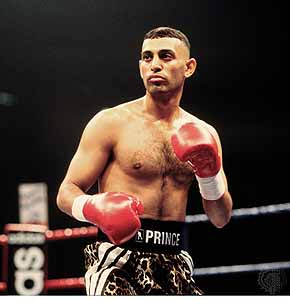
Why he should be in: Led a resurgence in the lower-weight divisions, a phenomenon that continues to resonate today. Is unfairly written off due to wide decision loss to Marco Antonio Barrera—a loss that is given way too much importance. Losing to Barrera is no disgrace, nor does it erase the considerable good work put in by Hamed. The “man” at featherweight for several dominant years. Hamed beat Manuel Medina, who would go on to win 3 more straps at 126. Tom Johnson was 44-2-2 and undefeated for 6 years before Hamed beat him. Kevin Kelley, who Hamed climbed off the deck to beat in a thriller, was 47-1-2. Wilfredo Vasquez was aging, but counts as a quality win, as does 22-1 Wayne McCullough. Routed an undefeated Paul Ingle, who would go on to crush Barrera-conqueror Junior Jones a few fights later. Ruined capable Augie Sanchez. Best win might be a 4th-round blasting of excellent champion Vuyani Bungu, who was undefeated for 8 years and coming off a fruitful 13-defense reign. These are some very good wins, heightened in importance when one considers the dominance Hamed showed in winning them. On a purely visceral level, it’s hard to deny that he was a unique fighter who was really special.
Why he probably won’t make it: Fighters who never shut up about telling you how great they are tend to not receive a lot of support. It’s like how you don’t give sympathy to people who complain constantly. Hamed did such a great job reminding everyone how great he was, that everyone else stopped saying it, especially after he lost to Barrera. That loss, while unfairly used to characterize Hamed’s entire career, was a devastating setback. It denied him a chance to beat a true star in the game and left him in absolute tatters. Never rebounded. Seemed to allow himself to slip at a time when he should have been gearing up to make a big run against the great fighters at and around his weight. If he kept it together, he could have participated in the featherweight renaissance that soon followed his exit from the limelight. While Barrera loss is given too much emphasis, the notion that he was a frontrunning fighter who picked on smaller and older guys is not entirely incorrect. All told—a profound disappointment. Like others on the list (Curry and Nunn), suffers from being measured against his expectations more than against other champions.
-Use the Links Below to Move onto the Next Article Segment-


